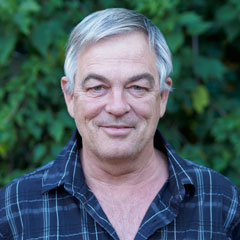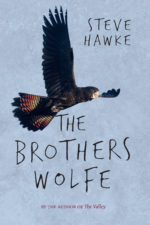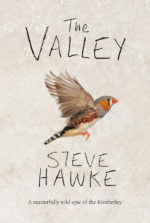Steve Hawke’s masterful family saga is about how secrets, ambition and greed implode down the generations

In The Brothers Wolfe, Elliot is the ambitious brother living for the best deals. Athol is the younger brother looking for his independence. Both have a foot in the family menswear business and their eye on a sexy French woman. It’s the perfect formula for financial ruin and a great read. We asked Steve Hawke to tell us more about it.
What was it about this era that compelled you to write about it – and where did the brothers Wolfe come from?
See epigraphs two and three – Donald Trump claiming entrepreneurship as an art form, and a psychoanalyst comparing the psyches of entrepreneurs to those of juvenile delinquents. I’ll admit to a horrified fascination with these men (they are all male, aren’t they?) who fancy themselves as titans. Why can enough never be enough? Why the animalistic imperative to grow ever bigger, to outdo every competitor? In the 1980s I did have some very marginal dealings with a couple of the ‘big boys’ and state politicians at the heart of WA Inc, and was astounded by their bombast and hubris. Fertile ground, I thought to myself.
So the seeds go back more than thirty years. As does one of the characters. The chapters describing Great-Aunt Ida’s trip to the Kimberley in the years before World War One are lifted from one of my first pieces of fiction, a short story titled ‘Promises of the Past’, published in 1993. (Though I would dare to suggest that the Ida of The Brothers Wolfe is a lot more complex and interesting than that ingenue.) That short story is framed as a young man listening to the memories of his great-aunt, so perhaps the seeds of the Athol Wolfe character were sown back then too.
The story of the Wolfe family fortune being based on the disinheritance of Frederick Wolfe is based on a truth. I knew and worked with an Indigenous family in the Kimberley who had been robbed in exactly this way: the will of their white patriarch disregarded. It always seemed so emblematic of our colonial history, and was always going to find its way into this story that I wanted to tell.
Where did the brothers idea come from? I needed to create a young entrepreneur a rung or two below the Bonds and Connells as the central character for the book I wanted to write. But I needed a counterbalance, an alternative viewpoint. I think if I’d had to dwell solely within the mindset and viewpoint of Elliot the entrepreneur I would have driven myself crazy. Thus I imagined Athol, the antithesis of action-man Elliot, for whom knowledge hangs around his neck like chains instead of pearls, to misquote the first epigraph. It happened a long time ago, and I can no longer remember the specific origins, though it is probably there in one of my notebooks. But I think the notion of two brothers with divergent attitudes to this family history, as well as to their contemporary lives, is where it began.
It’s been a long time in the making, this book. It may or may not turn out to be my magnum opus, but it has a bit of that feel about it: a grand stage, and grand themes, and an attempt to examine the psychology of a notorious chapter of Western Australian history.
Do you feel sympathy for any character in particular?
All of them! If you can’t find a way to relate to, and empathise / sympathise with the characters you create, you are not doing your job as a novelist.
That said, the reader will probably guess very easily that young brother Athol is the character closest to my own mindset and world view, and is, in some respects, the author’s voice in the book. (Though I’m not as wimpish as he is, I hope.)
I love Mitzi. I’ve got no idea where she came from, but I really love her. In the discussions about the title for the book, I voted for ‘The Brothers Wolfe’ but had some concerns that this was unfair to Mitzi, as she carries as much weight in the book as the two brothers. But in the end, I said to the publisher, ‘I reckon Mitzi can stand on her own two feet.’
And, let me say, the boys’ mother Cynthia has a certain mad magnificence, and indifference to reality, that appeals to me.
Did you encounter any surprises during the research process or as you delved back into the era of WA Inc?
Not really. I am old enough to have lived through it. One of my touchstones as I wrote was a book called The Bold Riders by financial journalist Trevor Sykes. It is a forensic examination of the high-flying entrepreneurs of the 1980s; how each of their empires was built, and how each crashed. What continually astounded me was how ruthlessly cavalier they were with other people’s money once they had got their hands on it. Essentially anything went, and the mug punters were fair game. The Brothers Wolfe doesn’t tell the half of it, but I hope it does provide some insight.
Getting my head around the intricacies of the truffle industry did take a bit of doing, I’ll admit.
What’s next for Steve Hawke?
I’ve already completed the first draft of my next novel, which has the working title Quiet Man. It is a much smaller work, and very different in nature to The Brothers Wolfe. Ideas are bubbling away for the one after, and there are a couple of non-fiction projects in prospect. It has taken until my sixties, but I seem to have reached the point of being a full-time writer, and it’s a good place to be.




